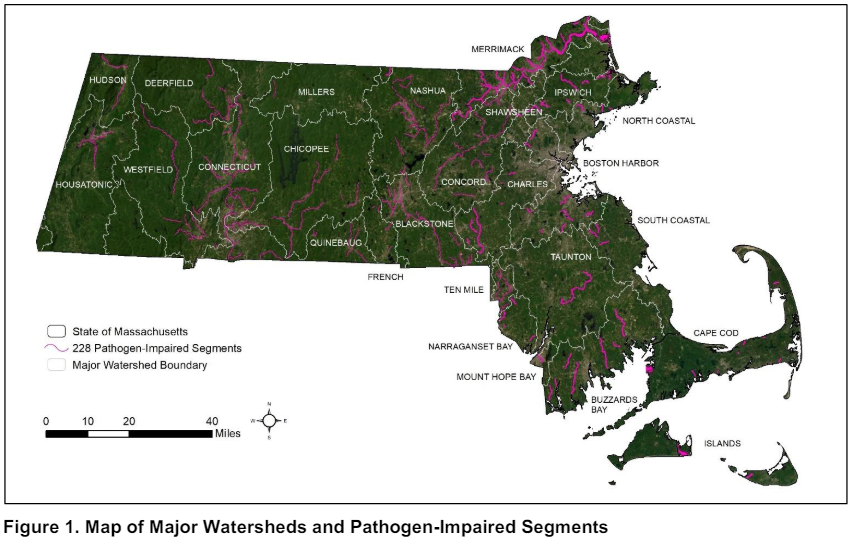Public comment period extended for draft limits on ‘pathogen-impaired’ waterbodies
A draft report released in April by the Massachusetts Department of Environmental Protection defines Dartmouth’s Paskamansett River and Shingle Island River as “impaired” waterbodies with pathogens that could include E. coli, Enterococci and fecal coliform.
The report detailed the statewide “Total Maximum Daily Load for Pathogen-Impaired Waterbodies,” but according to Dartmouth Public Health Director Christopher Michaud, the state failed to notify the town in due time.
As required by the federal Clean Water Act, Total Maximum Daily Loads have been instituted to restore the health of impaired waterbodies across the state, according to Michaud. The Total Maximum Daily Load determines how much pollutant can be in a waterbody.
Given that at least one of Dartmouth’s impaired waterbodies flows through the town’s major aquifer, Michaud has made an effort to make up for the lack of communication from the state department.
Though the public comment period was set to end Monday, June 10. After request, the department has extended the deadline to Friday, June 21 and will hold an additional public comment session Thursday, June 13 from 1 p.m. to 3 p.m. at the MassDEP Southeast Regional Office, located at 20 Riverside Drive, Lakeville. An informational session will be held before comment.
In a public information session produced by Dartmouth Community Media, Michaud said the Paskamansett is approximately 13 miles long and begins in New Bedford, flowing through “our major aquifer, which is our groundwater recharge area for our public water supply,” and then to Slocum River.
He said the Department of Environmental Protection has named some of the causes for this impairment, including urbanization, agriculture, overflowing septic systems and combined sewer overflows.
Michaud added that sewer overflows and discharges from wastewater treatment plants “do not exist in the Paskamansett, so it narrows the possibilities that could be causing this,” he added.
He encouraged all Dartmouth stakeholders to participate in the comment period in order to remedy the town’s impaired rivers, and if they don’t know what to say, residents can ask for more time and outreach.
“We should not be rushing this process due to some arbitrary deadline because what this will become is nothing more than the [Total Maximum Daily Load] we talked about so much last year for the Slocum River and nitrogen,” Michaud said.
He said the previous Total Maximum Daily Load process for nitrogen took too much time and it was “ultimately litigation that forced” the state department to “fast track” the Total Maximum Daily Loads to be within regulation.
Michaud added whatever is done for the Paskamansett River should be done for other waterbodies throughout town as well.
Those interested in participating in the June 13 session by Zoom should register ahead of time.
Comments can be sent until 5 p.m. on June 21 to Timothy Fox at timothy.m.fox@mass.gov and must include the subject line “Statewide Pathogen TMDL (CN 515.0) Comments.”
Or written comments can be mailed to:
Mass DEP Watershed Planning Program
Attn: Timothy Fox
8 New Bond Street
Worcester, MA 01606












